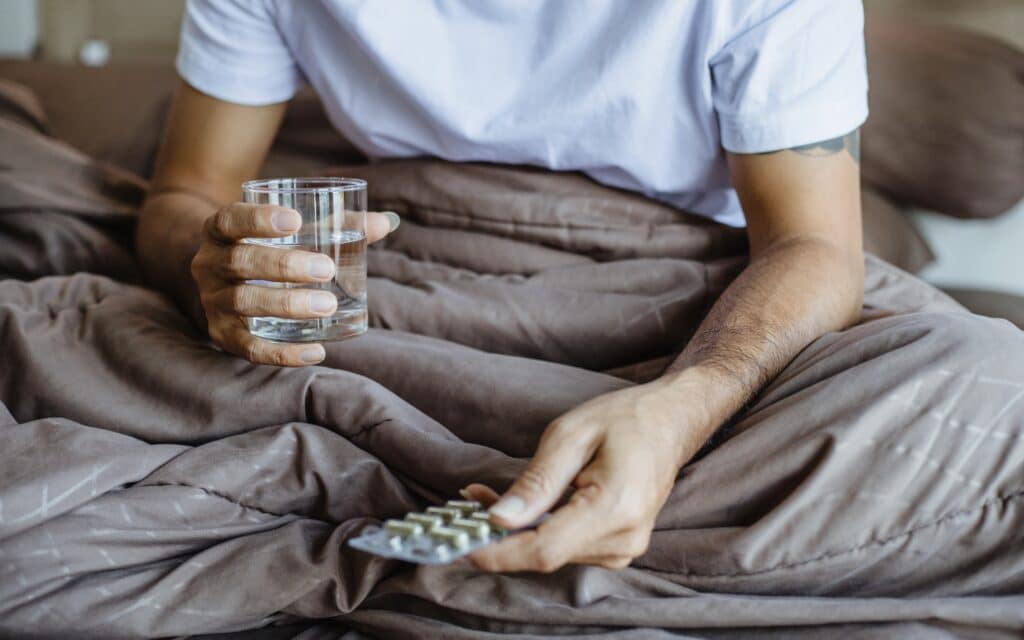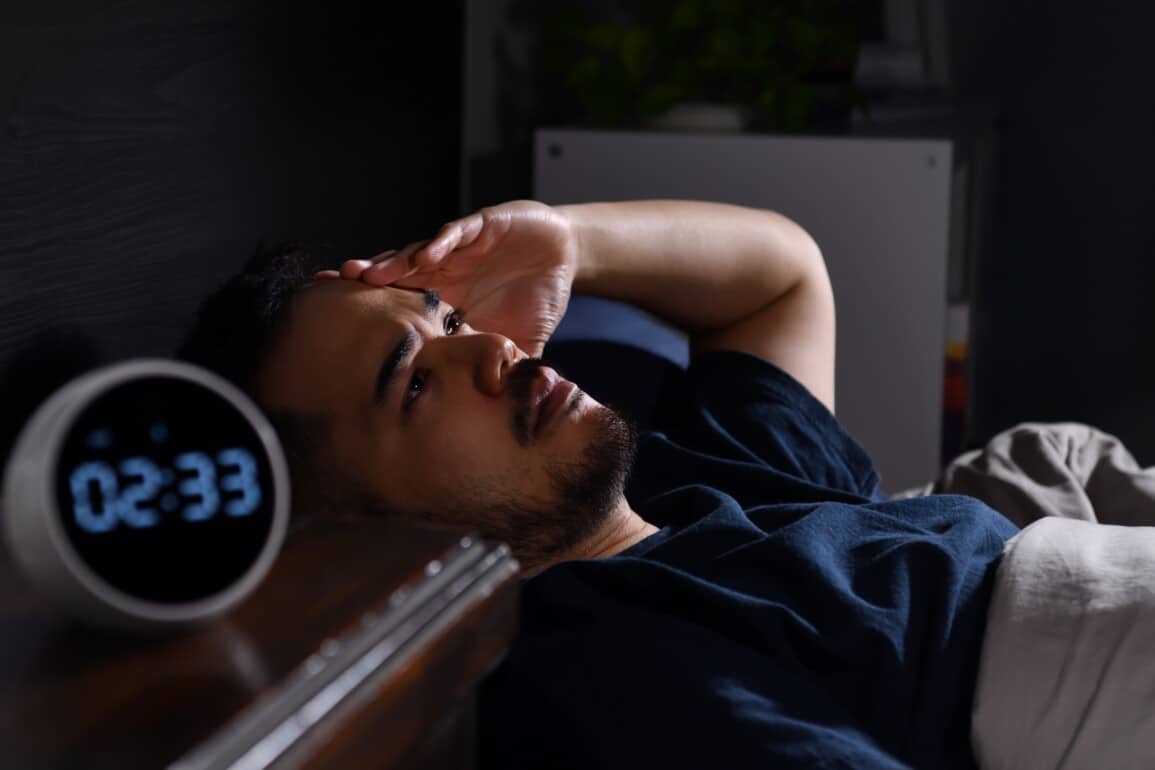Does Finasteride cause insomnia? Unfortunately, it’s true, Finasteride insomnia is a thing. This significant side effect comes with one of the most popular treatments for male hair loss and issues caused by an enlarged prostate. Read today’s post to learn about Finasteride insomnia and other hair-raising adverse effects.
Also sold under the name Propecia, Finasteride has proven to be very effective for its intended treatment purposes. However, like most medications, Finasteride can cause several unwanted symptoms.
Finasteride sleep disorders can be extremely problematic. They may lead to additional negative effects, such as the inability to continue treatment, and mood changes. Unfortunately there’s also a known link between bad sleep and hair loss.
If you believe you’re dealing with side effects as a result of taking Finasteride for hair loss or prostate problems, speaking to your doctor is the best way to determine a new treatment path. In the meantime, let’s explore some of the most important things to know about Finasteride and insomnia.
What is Finasteride?
Finasteride 1mg is a popular drug used for the treatment of male hair loss. Finasteride 5 mg is used to treat prostate problems such as an enlarged prostate.
It’s a drug responsible for blocking the 5 alpha-reductase enzymes. These convert testosterone into dihydrotestosterone – a hormone commonly associated with hair loss. DHT is the primary cause of male pattern baldness.
By inhibiting the enzyme most commonly linked to male pattern baldness, Finasteride stops the conversion of testosterone to DHT. This reduces the risk of hair loss in men.
The 5 alpha-reductase enzyme is present in the prostate, liver, and scalp. This is why Finasteride is commonly considered to be an effective treatment for prostate enlargement and hair loss alike.
Does Finasteride cause insomnia?
While Finasteride is commonly considered to be an effective treatment for hair loss, the medication can also have some significant side effects, including issues with sleep, decreased libido, and erectile dysfunction. The most common side effects of finasteride are:
- Impotence
- Reduced libido
- Decreased sexual pleasure
- Mood swings
- Mood changes
- Reduced sperm count
- Testicular pain
Most men who take this drug say they experience some sexual side effects, but few find the symptoms debilitating. On the other hand, the Finasteride insomnia issues can be much more significant.
Studies have revealed insomnia is most common among males, over the age of 60, who have been taking the drug for between 1 and 6 months.
Like with most drugs, the amount of Finasteride someone takes could increase their risk of negative side effects. Notably, a decrease in androgen levels created by the use of medications like Finasteride has been frequently associated with not just lower sleep efficiency, but also a higher risk of obstructive sleep apnea in some studies.
Recently, research into “post-finasteride syndrome”, which consist of sexual difficulties, neurologic, and psychological conditions has begun to accelerate.

Can Finasteride cause low mood? Finasteride sleep issues
One of the reasons why the Finasteride insomnia side effects faced by patients are so significant, is they can worsen other potential negative effects of the medication.
Research into the presence of Finasteride sleep issues in men who already experienced issues like impotency and changes to their sexual performance, found worrying results.
The studies showed men were at risk of suicide, if they experienced both persistent sexual side effects and insomnia. According to the research, the risk of severe mood-changes was particularly high for people under the age of 40 experiencing both sleep issues and sexual side effects.
If you do experience severely low mood or changes to your mood when taking any medication, including Finasteride, it’s important to make sure you seek help from a doctor as soon as possible. Your care provider will be able to direct you towards the right intervention.
Are Finasteride side effects reversible?
Figuring out how to reduce the side effects of Finasteride is a major concern for many people taking this drug. While it may be possible to reverse the side effects by stopping your use of the medication, most people don’t want to make the choice between insomnia and hair loss.
If you are taking Finasteride for hair loss and experiencing negative side effects, speaking to a doctor should provide you with some personalized advice on how to address the issues.
Notably, most men who take Finasteride will experience some side effects, so it’s important to remember you’re not alone. Usually, your doctor will review your medication and suggest options like:
Reducing your dosage
The higher the dose of any medication you take, the more likely you’ll be to experience more significant side effects. The most common side effects of Finasteride can sometimes be reduced by replacing your dosage with something as small as only 0.25mg per day. However, your doctor will need to determine which dosage to give you, so you can continue to experience the benefits of the drug, without the side effects.
Changing your routine
If you’ve been asking “Is it better to take Finasteride at night?” the answer may be “no” if you’re already struggling with insomnia. Your doctor might advice changing when you take your medication, to determine whether you experience fewer side effects when using the pill at specific times of day. Some people will experience fewer issues when they take Finasteride in the morning.
Taking supplements
It may be possible to improve your sleep pattern by taking supplements like melatonin. Melatonin is the natural hormone produced by your body, which can play an important role in your sleep-wake cycle. If taking this substance will have no negative impact on your consumption of Finasteride, it may be possible to take both medications at the same time.
It’s also worth discussing any other issues which might be contributing to your insomnia with your doctor. If you’re worried about your hair loss and feeling excess anxiety, then the racing thoughts you have at night could also be preventing you from getting to sleep.

How to reduce side effects of Finasteride
Addressing the side effects of Finasteride will take a personalized approach from each person experiencing symptoms. Discussing your case with your doctor will help them to pinpoint issues, which could be contributing to your poor sleep.
One of the most significant issues which could be worsening your experiences with Finasteride, is the consumption of alcohol. Drinking alcohol on Finasteride is not expressly prohibited, but doing so can worsen issues like impotency, and make it harder to achieve the right results with your sexual performance. Alcohol also has a negative impact on your sleep pattern.
While you might find yourself able to fall asleep faster with alcohol initially, your body will need to work hard to process the alcohol in your system.
This means you can’t completely “shut down” for a restorative night of rest. Reducing your intake of alcohol can significantly lower your risk of negative side effects with this medication.
Other ways to overcome the side effects of Finasteride include:
Talking to a therapist
Finasteride has been linked to various forms of mood disorders, depression, and anxiety. If you’re feeling down about the way you look, or you’re feeling depressed for any other reason, this could be making your issues with insomnia even worse and causing excess fatigue through the day. It’s often helpful to speak to a therapist in this situation.
Adjusting your sleep hygiene
Making changes to your sleep hygiene, like putting your phone down in the evening to give your brain a break before you go to bed, and creating a cool, comfortable space for sleep will help you get a good night’s rest. Most doctors will recommend making sleep hygiene changes when you’re trying to manage insomnia.
Following a routine
Following a specific pattern for bedtime is a good way to improve your chances of getting a good night’s sleep. Certain processes, like drinking tea, or having a hot bath before bed can help you to relax and get you in the right frame of mind for sleep.
Addressing sleep issues
If the cause of your sleep issues are underlying problems like obstructive sleep apnea, you may need to speak to your doctor to get specialist treatment for these conditions.
Understanding Finasteride insomnia
All medications, no matter how beneficial they may be, can come with the risk of additional side effects. You’ll need to be aware of this during your treatment. Often, when a doctor prescribes a medication like Finasteride, they’ll ask you to provide feedback regularly on any side effects or symptoms you might be experiencing.
Talking to your doctor about your Finasteride sleep disturbances doesn’t necessarily mean they’ll ask you to stop taking the medication. Instead, the two of you will likely work together to come up with a strategy for reducing your side effects and improving the results of your treatment.
In the meantime, consistently working on improving your sleep habits with good sleep hygiene is a great way to boost your sleep schedule’s efficacy. So you should be able to keep your healthy sleep routine and your hair at the same time!
Click here if you want to know about other medications that cause insomnia.
Siestio. Sleep Matters.
Now read these:
—Sleeping after Adderall
—Insomnia and Prednisone
—Insomnia and Lamotrigine
Medical disclaimer
You must not rely on the information provided on our website as an alternative to medical advice from your doctor or other healthcare professionals. For more information read our full disclaimer here.







